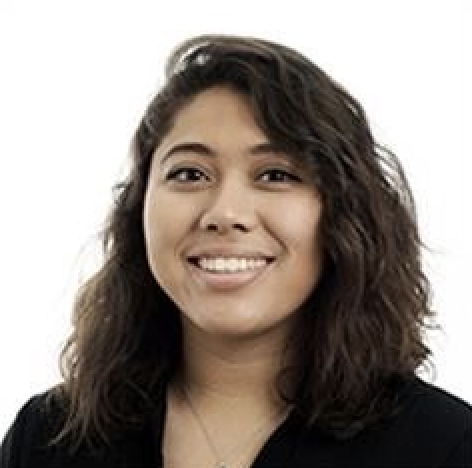Chelsea Alvarado Combines Data Science and Neuroscience
 How do brains work and how does technology affect them? This is what motivates Chelsea Alvarado, who is combining her passion for neuroscience with data science to discover new approaches to analyzing ever-expanding datasets. Chelsea is currently pursuing an M.S. in Data Science through the University of Virginia’s online program while part of a connectome annotator team with Janelia Research Campus.
How do brains work and how does technology affect them? This is what motivates Chelsea Alvarado, who is combining her passion for neuroscience with data science to discover new approaches to analyzing ever-expanding datasets. Chelsea is currently pursuing an M.S. in Data Science through the University of Virginia’s online program while part of a connectome annotator team with Janelia Research Campus.
“I chose to study data science because of my interest in neuroscience,” Alvarado said. “I work with connectome data of the fruit fly, and it's exciting to think about the possibilities of using methods developed on a small scale connectome like the fruit fly being used on the human connectome.”
Alvarado graduated from Sweet Briar College in 2017, the first in her family to attend college. Her parents emigrated from Bolivia and El Salvador to the United States where Alvarado was born and raised in Fairfax County, Virginia.
“As a first generation student, I am always learning something new,” Alvarado explained. “There were no instructions or roadmap for me to follow. I quickly learned there was no ‘right way’ to do something because no one in my family had done it before. I approached college as a learning process and figured things out as I went, like the application process, financial aid, and how to balance work and school. The best part is being able to now help my younger siblings and cousins go through the process themselves.”
At Sweet Briar, Alvarado majored in psychology and minored in biology and math. She attributes her interest in science to her dad.
“Growing up, my dad always encouraged me to explore and have as many experiences as possible,” Alvarado said. “He would take us to museums and libraries and every historical place or event that he could find.”
During college, Alvarado found ways outside of school to gain experience in psychology by working as a psychiatric technician at Dominion Hospital, which led her to apply for a job in crisis counseling in Richmond.
“I quickly found out why there is so much burnout in the profession,” Alvarado said of her experience in crisis counseling. With a continued excitement about psychology, but not as a practitioner in the field, Alvarado looked into jobs in neuroscience.
“I've always had an interest in neuroscience. That's what I've always wanted to do, so I started applying for jobs back home, and I ended up getting one working for the Janelia Research Campus in Ashburn.”
The Janelia Research Campus is a scientific research campus of the Howard Hughes Medical Institute (HHMI) which addresses important biomedical problems which require technological innovation. Alvarado works as a connectome annotator.
Connectome annotators “find, trace, annotate, identify and classify neurons as well as identify and mark synapses in the brain volumes” (Janelia Research Campus). They work to create a map of all the connections in the brain.
“The team I'm on is creating a connectome of the fruit fly brain, which is a complete map of its neural connections, central nervous system and everything,” Alvarado explained. “I provide analysis of the data retrieved from the HHMI connectome database, Neuprint, for lab heads and group leaders before, during, and after projects.”
Alvarado said that when she first started the job in 2018, she was working with thousands of images of the fruit fly brain. Overtime, she got more involved in the data behind the connectome. This led Alvarado to deciding to pursue the Online M.S. in Data Science at the University of Virginia.
“I wanted to continue my work at Janelia Research while learning data science,” Alvarado commented.
Alvarado began the online M.S. in Data Science program in the fall of 2020.
“I really enjoy the relationships and camaraderie between students in their cohort and across cohorts,” she said. “I also like the diversity of backgrounds that each classmate brings into the cohort. As a student with no working experience in data science, it is useful to hear from others who are more established and have real-life experience in the field.”
Looking to the future, Alvarado is excited to continue combining data science and neuroscience. She explained what she is already using from the program in her job.
“I'm already applying what I’ve learned in the M.S. in Data Science program to my job, like using Python to speed up my analysis of connectomic data,” noted Alvarado. “Eventually, I hope to use more advanced data science techniques to research psychiatric diseases, such as schizophrenia, eating disorders, and depression. Data science opens new doors to improving the lives of individuals suffering from these illnesses.”